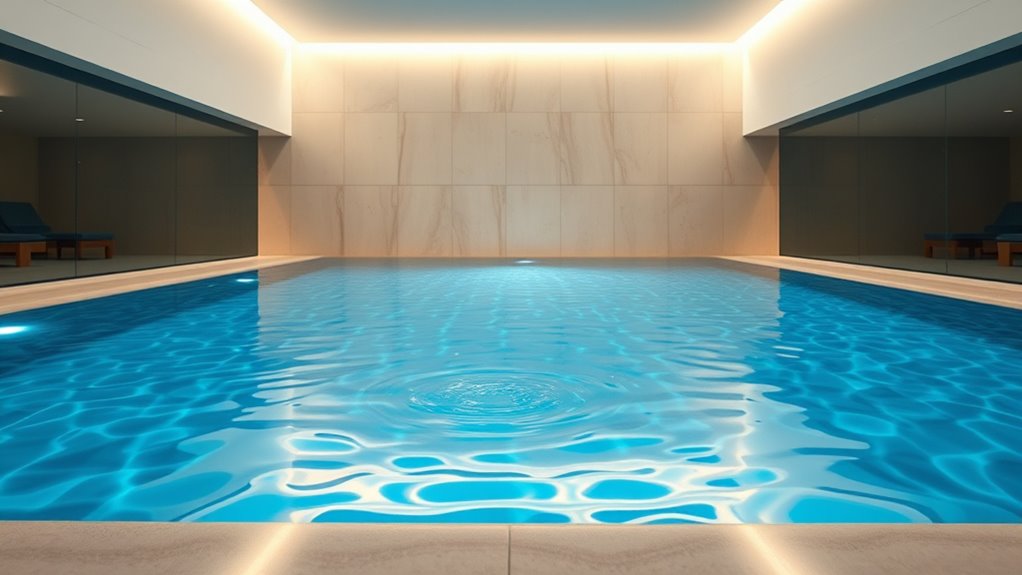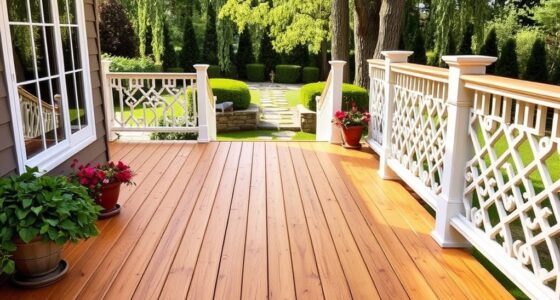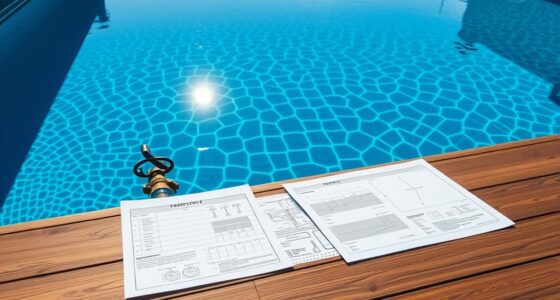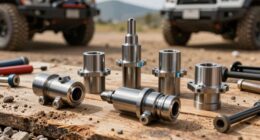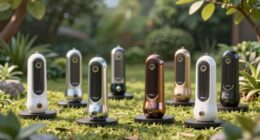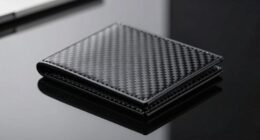Endless pools are surprisingly quiet, mainly due to their filtration systems and pumps. You’ll mostly hear a soft hum that blends into background noise, and high-end models can be even quieter with advanced insulation. Placement and setup matter—positioning near walls or in well-insulated rooms reduces sound. Proper maintenance also helps keep noise down. Curious about how to make your pool even quieter? Keep going for practical tips and insights.
Key Takeaways
- Endless pools produce minimal noise, mainly from the filtration system and pump, with sounds comparable to a soft hum.
- Standard models typically operate between 50-60 dB, while premium and high-end models are quieter at around 40-50 dB or lower.
- Proper installation, placement, and soundproofing significantly reduce perceived noise levels.
- Regular maintenance and vibration damping help keep operation quieter by preventing increased noise from loose parts.
- External factors like room insulation, placement near walls, and wind can influence how loud the pool sounds during operation.
Understanding the Typical Noise Levels of Endless Pools

Endless pools are known for their quiet operation, but understanding their typical noise levels can help you determine if they’re suitable for your space. Generally, these pools produce minimal noise, primarily from the filtration system and the pump. Most users report that the sound of the pump is comparable to a soft hum, blending into background noise rather than dominating the room. The motor’s noise level varies depending on the model and its power, but it’s usually well below the volume of a standard conversation. You won’t hear loud clanking or banging, as the design emphasizes smooth operation. Keep in mind, the placement of the pool and the room’s insulation can influence how much of this noise you actually perceive. Additionally, choosing models with advanced noise reduction features can further minimize operational sounds.
Factors That Affect How Loud Your Pool Will Be
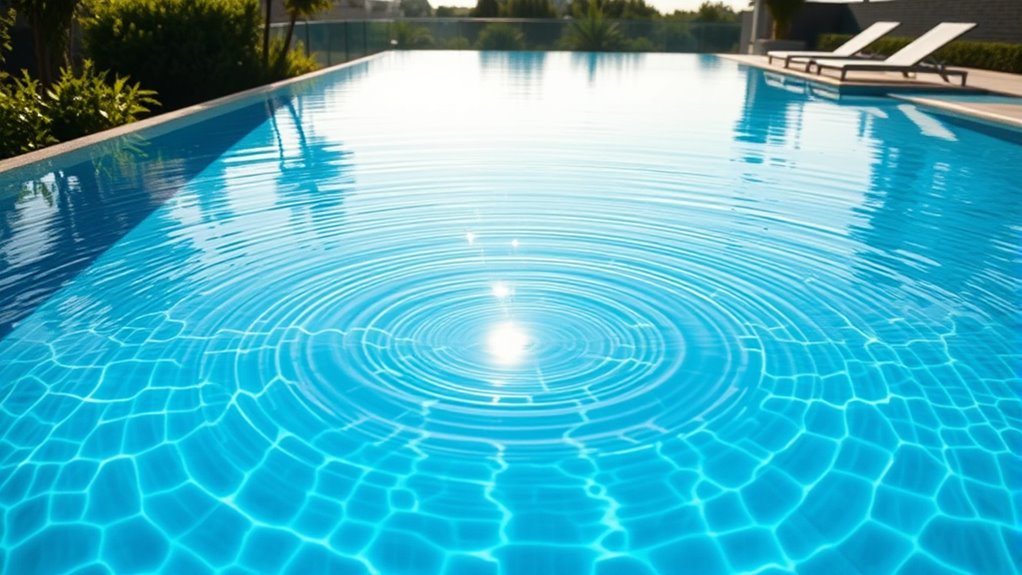
Several factors can influence how loud your pool will be in everyday use. The pump size and model directly impact noise levels, with larger or older pumps tending to be louder. The pool’s location also matters; placing it near walls or enclosed spaces can amplify sound. The type of filtration system you choose affects noise—some systems operate more quietly than others. Additionally, the pool’s water conditions, like turbulence and flow rate, can generate more noise if not properly maintained. External factors like surrounding structures, nearby equipment, and even wind can influence perceived loudness. Finally, how you operate the pool, such as running pumps at higher speeds, can considerably increase noise output. Being aware of these factors helps you manage and minimize pool noise effectively. Pump technology also plays a role in determining noise levels, with newer, quieter models designed specifically to reduce sound during operation.
Comparing Noise Levels: Different Models and Brands
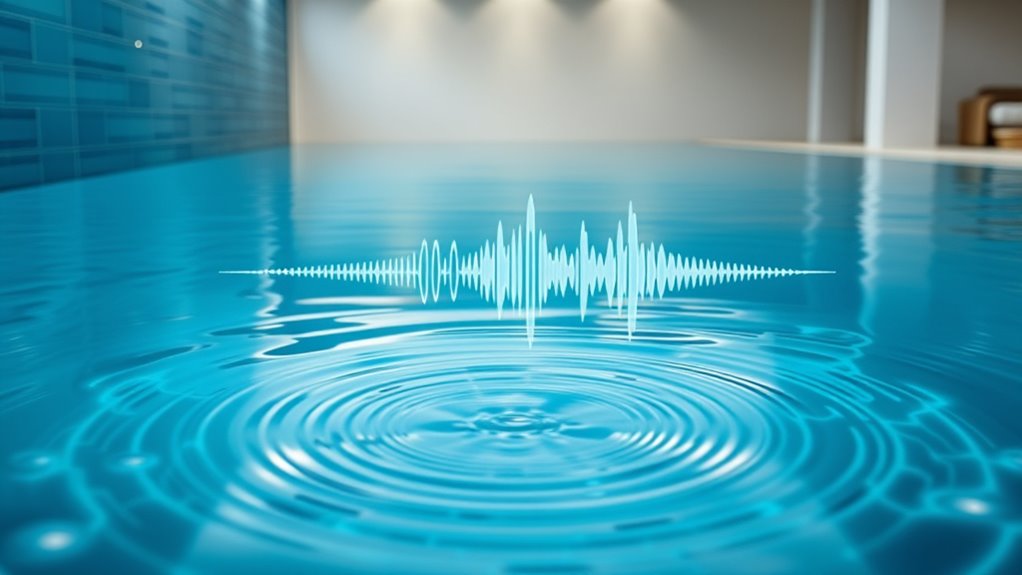
When comparing different pool models and brands, noise levels can vary considerably, making it important to choose wisely. Some models operate quietly, while others produce noticeable sounds during use. To help you compare, here’s a quick overview:
| Model Type | Approximate Noise Level | Notable Features |
|---|---|---|
| Standard Model | 50-60 dB | Basic pump, minimal noise |
| Premium Model | 40-50 dB | Quieter pump, sound insulation |
| High-End Model | 35-45 dB | Ultra-quiet, advanced technology |
Choosing a model with lower noise levels can markedly enhance your experience, especially if you value tranquility in your space. Additionally, Kia Tuning options like ECU remapping and suspension upgrades illustrate how performance modifications can also influence overall operation and comfort levels.
How Installation Choices Impact Sound Emissions
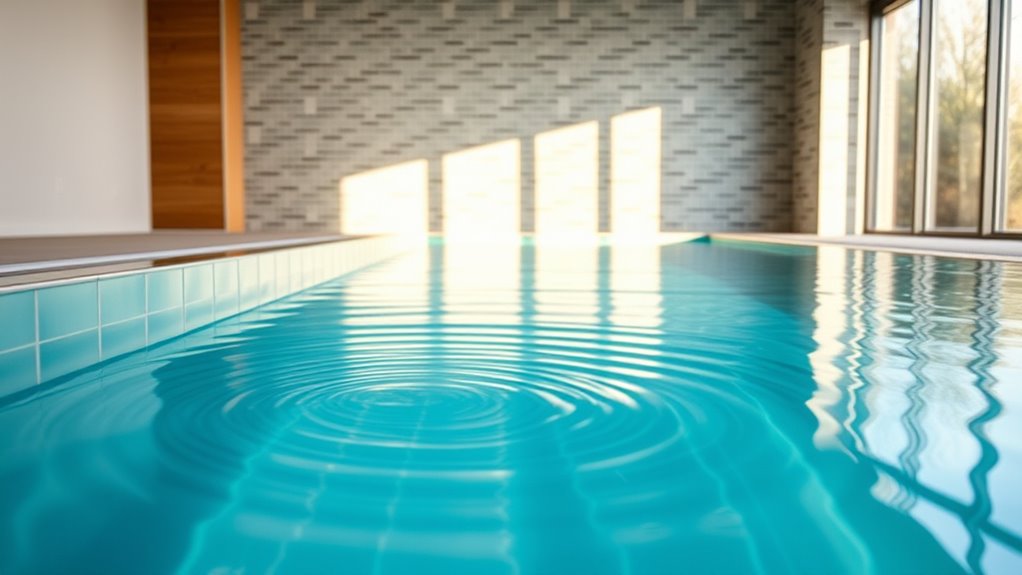
The way you install your pool considerably influences its noise emissions. Proper placement can reduce sound transmission to your home and neighbors. For example, positioning the pool on a solid, level surface minimizes vibrations that can amplify noise. Installing it over a concrete slab or reinforced base helps absorb vibrations from the pump and jets. Adding soundproof barriers, like thick fencing or dense landscaping, can further block noise from escaping. Avoid placing the pool near windows or thin walls, which can easily transmit sound. Also, guarantee that the equipment is installed on vibration-dampening mounts to prevent machinery noise from traveling. Your installation choices directly affect how loud your endless pool sounds during operation, so planning carefully can make a significant difference in noise levels.
Tips for Minimizing Noise During Operation

To keep noise levels down during operation, focus on maintaining your equipment regularly and correctly. Proper upkeep guarantees that parts function smoothly, reducing vibrations and noise. Check the pump and motor for loose components, and tighten or replace as needed. Using sound-dampening mats beneath the pool can absorb vibrations. Consider installing a noise barrier or enclosure around the pool area to contain sound. Adjusting the flow rate and avoiding unnecessary high-speed settings can also lower noise levels. Additionally, ensure the water level is ideal—too low can cause increased pump noise. Regularly inspect and clean filters to prevent strain on the system, which can amplify noise. Staying proactive with maintenance helps keep your Endless Pool quieter and more pleasant during use. Utilizing appropriate noise-reduction techniques can further enhance the tranquility of your pool environment.
What to Expect During Routine Maintenance and Repairs
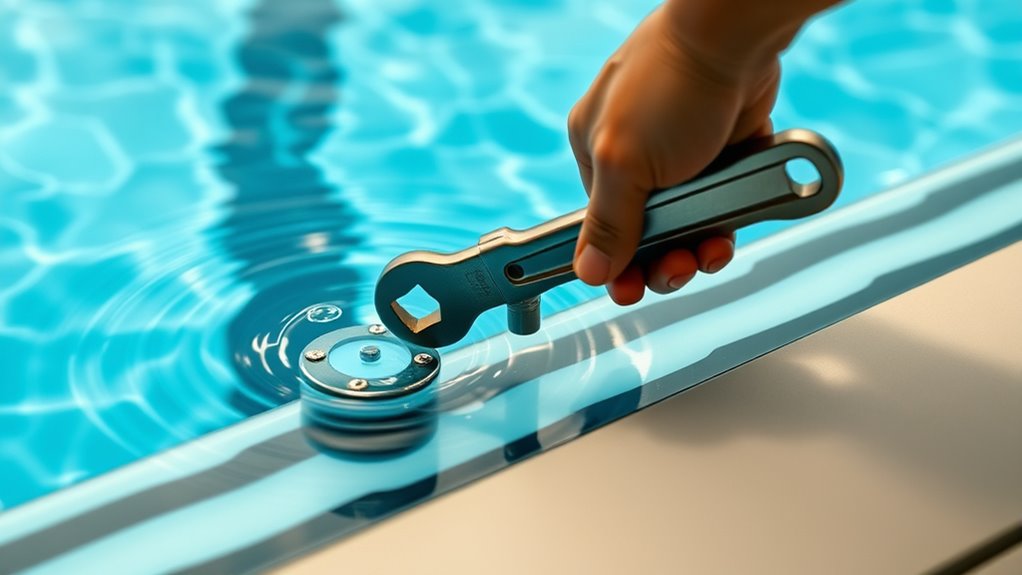
During routine maintenance and repairs, you might notice some noise, but it’s usually normal. However, unusual sounds like grinding or squealing can signal issues that need attention. Knowing what to expect helps you catch problems early and keep your pool running smoothly. Using professional equipment and proper techniques can also minimize disruptions and ensure safety during service. industry standards
Common Noise Levels During Maintenance
When performing routine maintenance or repairs on your endless pool, expect to hear a range of sounds that can vary depending on the specific task. You might notice moderate to loud noises as mechanical parts are adjusted or replaced. These sounds typically include:
- Clanking of tools and parts during disassembly
- Humming or buzzing from pumps or filters
- Drilling or screwing sounds when securing components
- Dripping or splashing if hoses are disconnected
- Whirring from motors during testing or adjustments
Most of these noises are temporary and directly tied to the maintenance process. They’re usually within a range of 60 to 85 decibels, similar to household appliances, and should subside once the work is complete. Additionally, understanding industry transformations can help you better prepare for advanced maintenance techniques and equipment updates.
Unusual Sounds Indicating Problems
Unusual sounds during maintenance often signal underlying issues that need attention. If you notice knocking, grinding, or squealing, don’t ignore them. These noises can indicate problems like worn bearings, loose parts, or motor strain. Addressing these sounds early can prevent costly repairs or downtime. Additionally, consistent monitoring of bedroom elements can help maintain a peaceful environment.
Frequently Asked Questions
Can Endless Pools Disturb Neighbors During Nighttime Use?
Yes, an Endless Pool can disturb neighbors during nighttime use if it’s not properly insulated or located close to property lines. The motor and water circulation system produce noise that might carry outside, especially in quiet environments. To avoid issues, you should consider installing soundproofing, choosing a strategic location, or limiting nighttime use. Being mindful of noise levels helps maintain good neighbor relations and ensures everyone stays comfortable.
Are There Specific Soundproofing Options for Quieter Operation?
Yes, you can find soundproofing options to make your endless pool quieter. You might install acoustic panels around the area, add rubber mats beneath the equipment, or enclose the pool in a specialized soundproof room. These solutions absorb vibrations and reduce noise transmission, helping you enjoy your pool without disturbing neighbors. Combining these measures offers the best results for quieter operation and peaceful surroundings.
How Does Ambient Outdoor Noise Affect Perceived Pool Sound Levels?
Ambient outdoor noise acts like a muffling blanket, often making your pool’s sounds seem quieter than they truly are. When the surroundings are noisy—like traffic or wind—your pool’s hum blends into the background, reducing perceived loudness. Conversely, a peaceful outdoor setting highlights the pool’s noise, making it seem louder. To maintain a comfortable sound level, consider natural or added sound barriers that blend with your environment.
Do Different Water Temperatures Influence Noise Emission?
Yes, different water temperatures can influence noise emission from your pool. Warmer water tends to produce more noise due to increased evaporation and bubbling sounds from pumps and filters. Cooler water generally results in quieter operation because these processes are less active. You might notice higher noise levels during hot days when equipment works harder to maintain temperature, so adjusting your pool’s settings or equipment placement can help minimize noise disturbance.
Is There an Industry Standard for Acceptable Noise Levels?
Yes, there are industry standards for acceptable noise levels, typically set by organizations like the EPA or local regulations. These standards aim to limit noise pollution and ensure comfort. As a user, you should look for pools that meet these guidelines, usually keeping noise below 55-60 decibels during operation. Always check the manufacturer’s specifications and guarantee proper installation to maintain acceptable noise levels.
Conclusion
Knowing what to expect from your endless pool’s noise levels helps you enjoy it more. Did you know that some models operate at around 55 decibels—comparable to a quiet conversation? By considering factors like installation and maintenance, you can keep noise to a minimum. So, before diving in, plan your setup carefully. With the right choices, you’ll create a peaceful oasis where relaxation isn’t disturbed by unexpected sounds.
